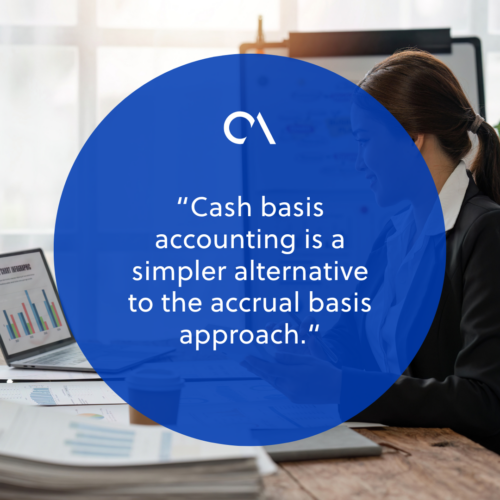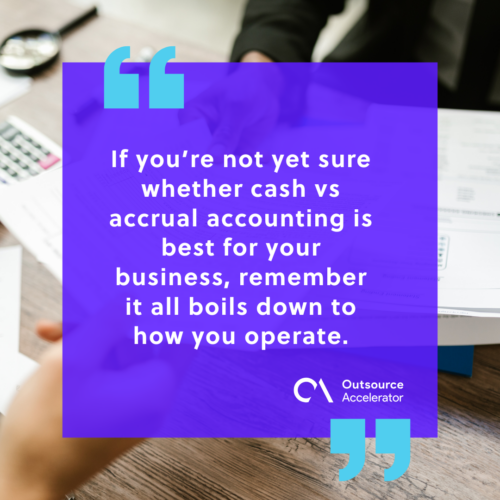Cash vs accrual accounting: Differences explained

Whether you’re a finance geek or just trying to keep your business afloat, understanding the differences between cash vs accrual accounting is a must. These two methods shape how businesses track income, expenses, and (perhaps most importantly) how much they owe in taxes.
Let’s break it down.
What is cash basis accounting?
Cash basis accounting is a simpler alternative to the accrual basis approach. With cash basis accounting, you record revenue when you receive money and expenses are recorded when they are paid.
It’s simple, direct, and operates like a personal checking account. If the money isn’t in your hand, it doesn’t exist (at least not yet). Because of this, cash basis accounting doesn’t recognize accounts payable and accounts receivable.

Pros and cons of cash basis accounting
Here are some of the advantages and disadvantages of cash basis accounting:
| Pros of cash basis accounting | Cons of cash basis accounting |
| Cash basis accounting is the simplest accounting method. There’s no need for complex calculations or tracking invoices that haven’t been paid yet. | Cash basis accounting is not compliant with the generally accepted accounting principles (GAAP). If your business grows or seeks investors, you’ll likely have to switch to accrual accounting. |
| You’d have a clear cash flow picture. If there’s money in the account, you know it’s available. | It provides an inaccurate long-term picture. Just because you haven’t paid a bill yet doesn’t mean it’s not a financial obligation. Cash basis accounting doesn’t show your business’ liabilities or the liabilities clients and customers owe you. |
| There are potential tax benefits. Since you only pay taxes on the income you’ve received, you might be able to defer some tax liability. | The IRS limits cash basis accounting to certain businesses. You can’t use it if you offer credit to customers, earn over $30 million on average in the last three years, or need inventory to track income. |
What is accrual basis accounting?
Accrual accounting provides the big picture of your business’s financial health, even if some transactions exist in the future. You record income when you earn it, not when you receive it. In simple terms, the money is already accounted for before it arrives.
The same applies to expenses—they are recorded when incurred, not when they are actually paid. While accrual accounting is more complex than cash basis accounting, it offers a more accurate representation of a company’s financial position.
Pros and cons of accrual basis accounting
Here are the benefits and challenges when you use accrual basis accounting:
| Pros of accrual basis accounting | Cons of accrual basis accounting |
| You’d have better financial insight. Accrual basis accounting presents a more accurate reflection of how your business is doing because it accounts for anticipated incoming and outgoing money. | Accrual basis accounting requires tracking invoices, expenses, and money that have been recorded, but not yet settled. |
| It’s GAAP-compliant. If you ever want to scale, attract investors, or apply for loans, accrual basis accounting is the way to go. | There’d be a cash flow disconnect. Your books may say you’re profitable, but your bank account might disagree. |
| This approach helps with financial planning. Knowing what’s coming helps with budgeting and decision-making. | There might be some potential tax surprises. You might owe taxes on money you haven’t even received yet. |
Comparing cash vs accrual accounting
Both cash and accrual accounting have their place, but the right choice depends on how your business operates. Here’s a simpler, side-by-side breakdown of what was discussed:
| Cash basis accounting | Accrual basis accounting | |
| Revenue recognition | When cash is received | When revenue is earned, even if the payment is pending |
| Expense recognition | When cash is paid | When expense is incurred, even if unpaid |
| Complexity | Simple to manage | Requires more bookkeeping and tracking |
| Financial accuracy | Reflects short-term cash flow | Provides a more comprehensive, long-term financial picture |
| Taxation | Taxes paid only on money received | Taxes paid on earned income, even if they’re not yet received |
How cash vs accrual accounting affects taxes
Your chosen accounting method plays a huge role in how you’re taxed. To reiterate, if you use cash accounting, you only pay taxes on money you’ve actually received. This can be a major advantage if you want to push some tax liability into the next year.
Accrual accounting, on the other hand, requires you to report income as soon as it’s earned even if you’re still waiting on payment.
Example: Let’s say you send a $10,000 invoice in December, but your client doesn’t pay until January. Under cash accounting, you wouldn’t have to report that income until the new year.
On the other hand, it already counts as income for December under accrual accounting. This means you might owe taxes on money that hasn’t hit your account yet.
Which accounting method should you use
If you’re not yet sure whether cash vs accrual accounting is best for your business, remember it all boils down to how you operate.

Choose cash basis accounting if you’re a freelancer, sole proprietor, or small business owner who just wants a simple way to track money in and out. Otherwise, go with accrual basis accounting if your company is growing, needs accurate financial reporting, or is required to comply with GAAP.
You can also consider a hybrid approach if you want elements of both. Some businesses track daily transactions using cash accounting but prepare financial statements on an accrual basis.
And if you’re still unsure? Talk to an accountant. Tax season is stressful enough without second-guessing your approach.







 Independent
Independent




